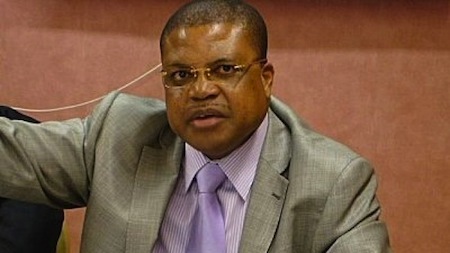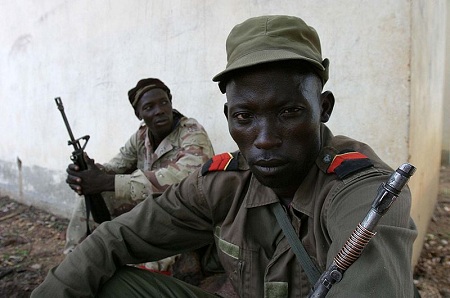Though the January centrafricaine ceasefire between the administration of François Bozizé and Séléka coalition rebels didn’t last much over two months, its elevation of Nicolas Tiangaye to government may yet provide a solution for governing Central African Republic in a diplomatic impasse that’s become a tricky international issue for African countries from Chad to South Africa. ![]()
Séléka coalition rebels took control of the capital, Bangui, on March 24, forcing Bozizé into exile, and proclaiming Michel Djotodia as the country’s new interim president. But the new government just as quickly reappointed Nicolas Tiangaye as the country’s prime minister. Tiangaye (pictured above), a well-respected constitutional attorney and human rights activist whose role in centrafricaine politics goes back to the 1980s and before, became prime minister pursuant to the January ceasefire agreement.
Where Tiangaye was once the figure that the rebels looked to as ‘their man’ in Bozizé’s government, Tiangaye has now become the man who pro-Bozizé forces now look to as ‘their man’ in the rebel-led government — indeed, both sides continue to praise Tiangaye, who founded the Central African Human Rights League in the 1990s:
“A man of integrity in a sea of corruption,” says one diplomat. “He has integrity. His record is impeccable. He doesn’t compromise,” adds top opposition figure Martin Ziguele. “A good person,” says Eric Massi, spokesman for the Seleka rebels. “We respect him,” adds a member of government.
To the extent that the international community can force a political settlement, all paths go through Tiangaye.
That hasn’t been enough to win the international stamp of approval — Chadian president Idriss Derby, speaking on behalf of the Economic Community of Central African States today, has refused to recognize the self-appointed Djotodia government, and other countries, including the United States, those from the African Union and those from the European Union, have been hesitant to recognize Djotodia, a former civil servant in the administration of Ange-Félix Patassé (Bozizé’s predecessor) and leader of the Union of Democratic Forces for Unity (UFDR), only gained power of the broad Séléka rebel group in recent years.
As it stands now, the CAR has been suspended from the African Union, which also froze the Séléka rebels’ assets and imposed a travel ban on Séléka leaders.
That’s in part because Djotodia, days after taking power, dissolved the country’s parliament and suspended the country’s constitution for a three-year period, claiming that he would hold power through 2016, when new elections would be called — a timeline that much of the international community thinks is too slow. Djotodia was appointed in February 2013 as a deputy prime minister for national defense under the auspices of the ill-fated ceasefire agreement.
It’s also because, in taking power, rebels killed 13 South Africans troops, out of a contingent of around 200 that came to Bangui ostensibly to protect South African mining, oil and other contracts.
Continue reading Longtime centrafricaine attorney Tiangaye key to peaceful CAR resolution

